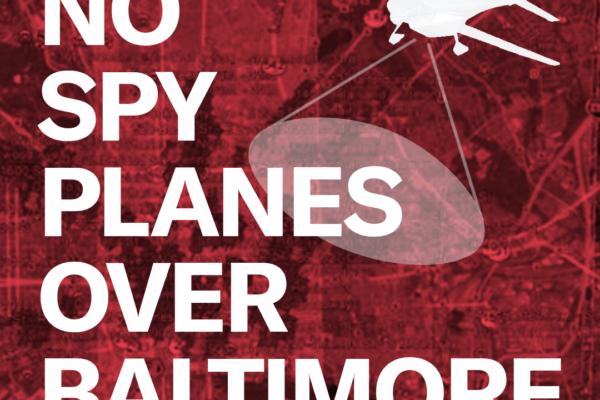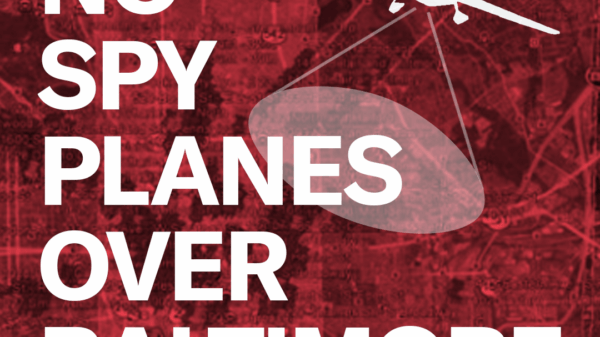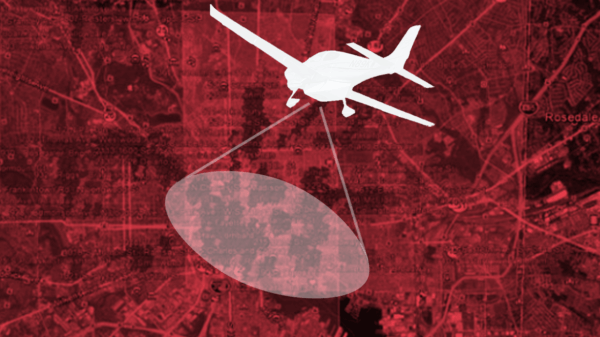BALTIMORE — A U.S. federal court of appeals today upheld a lower court decision by a 2-1 vote, refusing to temporarily block the Baltimore Police Department (BPD) from deploying its wide-area aerial surveillance program — a program that puts the daytime movements of virtually all Baltimore residents under surveillance. The decision comes in a lawsuit and subsequent appeal filed by the American Civil Liberties Union and ACLU of Maryland requesting the court temporarily block the BPD from deploying and conducting a six month trial of the aerial surveillance program. Although two appellate judges voted to allow the program to proceed, Chief Judge Roger L. Gregory issued a dissent that highlighted the majority’s various legal and factual errors, the harmful and discriminatory impacts of overpolicing in Black communities, and the extraordinary grassroots work of the clients.
Judge Gregory concluded that the majority opinion “rest[s] on a fundamentally warped understanding of the facts” and that “[n]o crime rate can justify warrantless aerial surveillance of an entire city, wholly unchecked by the judiciary. . . . If merely preventing crime was enough to pass constitutional muster, the authority of the Fourth Amendment would become moot.” Judge Gregory also said that "the consequences of the AIR program’s unconstitutional nature are likely to be felt in the same overpoliced neighborhoods where BPD’s discriminatory practices have already left generational legacies.”
Judge Gregory concluded that the majority opinion “rest[s] on a fundamentally warped understanding of the facts” and that “[n]o crime rate can justify warrantless aerial surveillance of an entire city, wholly unchecked by the judiciary. . . . If merely preventing crime was enough to pass constitutional muster, the authority of the Fourth Amendment would become moot.” Judge Gregory also said that "the consequences of the AIR program’s unconstitutional nature are likely to be felt in the same overpoliced neighborhoods where BPD’s discriminatory practices have already left generational legacies.”
Below is comment from:
Brett Max Kaufman, senior staff attorney in the ACLU’s Center for Democracy: “We and our clients are extremely disappointed by the court’s decision failing to put a stop to this invasive surveillance technology. Because of this decision, this kind of aerial surveillance could become a chilling, all-seeing part of daily life across the country. And as the dissent pointed out, this oppressive surveillance is likely to fall on exactly the kinds of minority communities who have suffered under decades of segregationist and exclusionary policy and policing. This technology presents a society-changing threat to everyone’s right to privacy, and it must be stopped.”
David Rocah, senior staff attorney at the ACLU of Maryland: “It is only by ignoring Baltimore’s history of racism and exclusion that the Baltimore Police Department, and the majority in this case, can come to the conclusion that city’s residents are less deserving of the full protection of their rights. Fortunately, the fact that the spy plane is now being reassessed gives Mayor-elect Brandon Scott the opportunity to end this invasive mass-surveillance once and for all, and we call on him to do so. If we do not stop it here, this technology will surely spread and trample the rights of people in other cities across the country, particularly those of Black and Brown people.”
Case information can be found here.
Stay Informed
Sign up to be the first to hear about how to take action.
By completing this form, I agree to receive occasional emails per the terms of the ACLU’s privacy statement.
By completing this form, I agree to receive occasional emails per the terms of the ACLU’s privacy statement.



